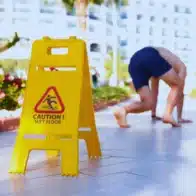You need a Las Vegas escalator injury lawyer if your injury required medical treatment or resulted in lost wages, especially if it was caused by mechanical failure, poor maintenance, or negligent property management.
Table of Contents
ToggleEscalator accidents in Las Vegas casinos, hotels, shopping centers, and convention facilities can result in severe injuries including broken bones, traumatic brain injuries, severed fingers or toes, crush injuries, and permanent scarring. These cases are complex because they involve premises liability law, mechanical engineering evidence, and often corporate defendants with aggressive legal teams fighting to minimize payouts.
You should contact an escalator injury attorney immediately if the property owner or management company denies responsibility, the insurance company offers a quick settlement that doesn’t cover your full medical expenses, your injury requires ongoing treatment or causes permanent disability, or there’s evidence the escalator had prior safety issues or maintenance problems.
If you suffered an injury on an escalator, you have options. Contact an experienced escalator injury attorney at Burk Injury Lawyers for a free consultation at 702-620-2020.
Proving Premises Liability in Las Vegas
To recover damages in a premises liability case, victims must prove that negligence by a property owner or maintenance team caused their injuries. Under Nevada law, property owners must take reasonable steps to keep guests safe. Because Nevada follows comparative negligence models, you can recover compensation only if you are 50% or less at fault for the accident.
Why Are Escalators So Dangerous?
There are many things that go wrong with an escalator, including sudden stops and starts that can make it easy for riders to lose their balance and fall. It is even possible for riders to fall over the side of an escalator if its sidewalls are not high enough. Broken or missing steps and stalled escalators being used as stairs can also cause falls.
Falls from escalators can cause:
- Bruises and lacerations
- Scars
- Bone fractures
- Spinal injuries
- Head injuries
- Internal bleeding and damage to organs
It is also possible for escalator falls to cause permanent paralysis or death to a victim.
Common Causes of Escalator Injuries
Understanding what can cause an escalator injury can help you determine what caused your accident and who you can hold liable for your injuries. Some common causes of escalator injuries include:
Entrapment
Entrapment is where limbs or articles of clothing or jewelry get caught in the cracks or grooves of an escalator, leaving you trapped,
Falls
Falls are often caused by uneven escalator steps or sudden stops or jerky movements, which could lead to loss of balance.
Malfunctions
Malfunctions, such as breaking components or sudden reversal or stopping, can lead to structural collapse or falls that result in injury.
Other common causes of escalator injuries includes insufficient maintenance, or design flaws.
Las Vegas, Land of Casinos and Elaborate Escalators
Escalators are found in casinos and throughout Las Vegas to alleviate pedestrian traffic. The city is no stranger to escalator accidents. Recently, an escalator malfunction in a major casino caused injuries to 12 people who were treated at a hospital in November 2019. Casinos are frequently cited for violations by county building inspectors for various issues that threaten the safety of guests.
Just like many of the casinos in Las Vegas, some escalators are designed to entertain riders with their flashiness and design. For example, one casino’s escalator features multiple LED screens that flash graphics as visitors travel up and down. Such features are distracting or disorienting to riders. Another escalator basically rivals an amusement park ride as riders descend a steep spiral.
Why You May Need a Las Vegas Escalator Injury Lawyer
Determining who is liable for an escalator injury can be complicated. Multiple parties, such as a casino owner, property manager, maintenance vendor, or manufacturer, may share responsibility. Insurance companies often deny or minimize claims to limit payouts.
A Burk Injury Lawyers attorney can:
- Obtain maintenance logs, inspection records, and witness statements.
- Secure expert opinions to show how negligence caused the malfunction.
- Negotiate aggressively with insurers, or take your case to court if necessary.
If you were injured on an escalator in Las Vegas, don’t wait. Call Burk Injury Lawyers at 702-620-2020 for a free consultation and start protecting your right to full compensation.
Escalator Injury FAQs
How Common Are Escalator Injuries?
According to the National Library of Medicine, there are 10,000 escalator accidents reported annually in the United States that result in injuries that needed hospital treatment, with the most common type of escalator accident being falls. Around 2 or 3 deaths per year are attributed to escalators and elevators combined.
What Compensation Can I Recover in an Escalator Injury lawsuit?
In an escalator injury lawsuit, you can recover economic and non-economic damages.
Economic damages, also known as special damages, are the tangible, financial losses you incurred due to your accident. This can include medical bills, lost wages, lost earning capacity, and future medical expenses. Non-Economic damages (general damages), however, are the intangible losses you incurred from your accident. This can be pain and suffering, emotional distress, depression, loss of consortium, and loss of enjoyment of life.
What Is the Statute of Limitations for Escalator Accident Claims?
Generally, you have two years from the date of your injury to file a claim, but you should file your claim as soon as you are able to, because the sooner you file your claim, the stronger your case will be. Evidence can disappear over time, and injuries heal, making it harder to prove your case the longer you wait.
Who Is the Most at Risk for Escalator Injuries?
Children, seniors, and people with mobility challenges are most vulnerable to escalator injuries in crowded Las Vegas casinos and resorts.




